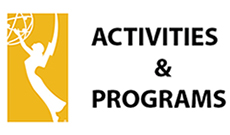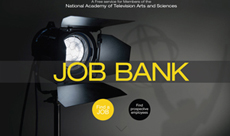REGIONAL HIGH SCHOOL STUDENT PRODUCTION AWARDS
CALL FOR ENTRIES – 2024-25
Eligibility Period: March 1, 2024 – February 28, 2025
Entry Deadline: March 15, 2025 EXTENDED TO WED, MARCH 19TH
Link to download Call for Entries
THE NATIONAL ACADEMY OF TELEVISION ARTS & SCIENCES
NATAS is a professional service organization dedicated to the advancement of the arts and sciences of television and related media and the promotion of creative leadership for artistic, educational and technical achievements within the television industry, best known for the coveted Emmy® Award.
PURPOSE
To recognize outstanding student achievement in production by conferring awards of merit in the Chapter’s designated awards region. The presentation of these awards is intended to be an incentive for the continued pursuit of excellence by those studying media and journalism and to focus public attention on outstanding cultural, educational, technological, entertainment, news and informational achievements by undergraduate college and/or high school students.
STANDARD RULES AND REGULATIONS
ELIGIBILITY
1. Projects conceived, produced and executed by students at a high school, university, college or technical/vocational school within the Chapter’s designated awards region are eligible for student award consideration.
2. Returning students who previously worked as professionals are not eligible.
3. No professional services may have been employed in the production of the entry.
4. Faculty involvement can only be advisory.
5. Entrants must be enrolled as a full-time student during the eligibility period
6. Students may enter work that was produced as a class assignment, extra-curricular assignment or in conjunction with their academic experience under an advisor’s guidance.
7. Students who perform professional work may enter their work in the professional awards competition, provided they meet all eligibility requirements.
8. No entry may be submitted to more than one Chapter’s awards.
9. The entry does not need to have been broadcast, cablecast or webcast to be eligible.
10. Entry videos must be submitted as they were originally presented to the advisor. No edits to the originally completed video are permitted except for edits to bring the entry length within the specified category time limit. When editing for time, use only straight cuts with one second of black to denote where content has been removed.
11. There is no limit to the number of entries a school may submit in each category.
12. Pornographic, violent, defamatory or offensive material is not accepted. The interpretation of the Awards Committee is final and absolute.
13. Ineligible entries may be disqualified during any phase of the competition.
STUDENT PRODUCTIONS
Students are not considered peer professionals and as such, their regional student productions are not eligible for Emmy® Award recognition. If material is produced as part of a class, for which school credit is received, they are considered a student. If they are paid or working on a project with industry professionals and want to enter the Chapter’s Emmy® Awards competition, they cannot enter as a student, but instead must pay the appropriate Emmy® Award entry fees. The student is then prohibited from entering or being listed with other classmates on any Student Production Award submissions during the same awards eligibility year.
ENTRY SUBMISSIONS
A teacher, professor or advisor must approve the entry even if the student handles the submission or upload process themselves. There is no limit to the number of entries a school may submit.
ORIGINAL MATERIAL
At least two-thirds of an entry must consist of original material, unless previously produced material has been given some unique and creative treatment. Entrants must specifically identify and give credit to all non-original material included in the entry. This includes music as well as use of video or graphic templates.
Videos that include popular or otherwise copyrighted music not specifically licensed for the project may not be submitted. If permission has been granted, documentation is required and should be uploaded as supporting documentation with the entry.
Use of video or graphics templates must be divulged in the essay for the entry citing the source for the template, how it was used and what the entrant learned by incorporating a template as part of the project.
VIDEO RATIO/FORMAT
Vertical video submissions are allowed in any category.
LANGUAGE(S)
Entries in English will be judged by English-speaking professionals. Entries in Spanish will be judged by Spanish-speaking professionals. Entries in other languages may be entered. We recommend that entrants in languages other than English or Spanish submit an English-language translation of the narration track.
DOUBLE DIPPING
No single entry may be submitted in its entirety in more than one Programming category. The same student may not be listed on more than one entry for performing the same production role/job for the same content submitted to more than one category. If a student was responsible for more than one role, they may submit the video in the appropriate craft categories to be judged for that particular craft (i.e. Writer, Editor, etc.).
ENTRY ERRORS AND OMISSIONS
The National Academy of Television Arts & Sciences assumes no responsibility for the acts or omissions of those individuals or entities submitting entries pursuant to this notice. All submitting entities and/or individuals are advised to review submissions with respect to correct name credits and other information. NATAS shall accept all submissions that are not in conflict with any of its rules and regulations.
INTENTIONAL FALSIFICATION
The faculty advisor warrants that they are the party most responsible for verifying that eligibility requirements have been met. The intentional falsification of production credits or entry credits may be the basis for disqualification at any point in the competition including after awards recognition has been announced.
FEES
While a fee to cover administrative expenses may be charged, there may be no individual student entry fees. Membership is not a requirement for advisors or entrants. NO ENTRY FEES AGAIN FOR 2025. Thanks to a generous donation in honor of Steve Shlisky our past president & activities chair, all entry fees have been waved again for this year.
JUDGING AND EVALUATION
Programming Categories are judged on three criteria: content, creativity and execution on a 7-point scale (maximum 21 points); and Craft Categories are judged on two criteria: creativity and execution (maximum 14 points). Judging panels are to be made up of qualified professional and academic judges. Judges have the option of including constructive comments or feedback, to be returned to the student’s faculty advisor.
AWARDS
A crystal pillar is awarded to the school for entries validated by a professor or advisor. Students responsible for the production will each receive a certificate. Duplicate pillars may be purchased for students listed on winning entries after the awards presentation.
RESTRICTION ON THE USE OF EMMY® MARK
Schools may refer to the fact that they are recipients of a NATAS Student Production Award, but may not use the Emmy® name or replica of the Emmy® figure in any form of commercial advertising or promotion.
NATIONAL CONTEST
Regional recipients will automatically advance to the National Student Production Awards. Recipients of these national awards will be announced at an event later in the year. For more information visit the website: http://emmyonline.org/nationalstudent
REGIONAL HIGH SCHOOL
STUDENT PRODUCTION AWARDS
For over a decade the regional chapters of The National Academy of Television Arts & Sciences have hosted the Regional High School Student Production Awards. These competitive Awards include programming and craft categories. For winning entries, a crystal pillar with the Student Production Awards logo is presented to the school recognizing the achievement of the student production. The students receive individual certificates from their regional chapter.
Regional recipients will automatically advance to the National Student Production Awards. Recipients of these national awards will be announced at an event later in the year. For more information visit the website: https://theemmys.tv/nspa/
PROGRAMMING CATEGORIES
Note: The same material may not be entered in more than one programming category.
101 – Newscast
Entry Time Limit: 30 minutes
For outstanding achievement in a traditional, studio-style newscast, produced daily or less than daily, but broadcast, streamed or otherwise distributed as a live or recorded live program. Newscast may include pre-recorded packages or reports as well as in studio or on location live reports. Post edits are not permitted except for the removal of breaks. Entry will be judged on overall content, presentation, writing, format, teases, etc.
102 – Headline News
Entry Time Limit: 10 minutes
For outstanding achievement in a short newscast typically designed for social media distribution. Entries may be live or edited. The length of the original presentation must be 10 minutes or less. Entry will be judged on content, presentation, writing, format, teases, etc.
103 – Hard News Report
Entry Time Limit: 10 minutes
For outstanding achievement in a presentation of timely news, information or current events. Entries may contain spot news coverage, investigations as well as coverage of controversial issues. Entries will be judged on the basis of editorial content and pictorial coverage, which demonstrates awareness of broadcast journalistic standards including accuracy and fairness. Judges will particularly look for well-organized material paying close attention to clearly written narration and appropriate sound bites. Preference will be given to individual pieces demonstrating reporting and field production. In-studio set-up or anchor link work will not be considered as an asset unless it materially contributes to the editorial content of the individual report.
104 – Feature News Report
Entry Time Limit: 10 minutes
For outstanding achievement coverage of a feature news topic or story. Features are generally defined as stories that have a personal, emotional or creative slant and include elements that go beyond the scope of straight factual information found in a hard news story. Judges will look for well-organized material paying close attention to the use of appropriate sound bites, visual elements and narration to develop the story and create a connection with the audience.
105 – Solo Storyteller
Entry Time Limit: 10 minutes
For outstanding achievement by a single, cross-discipline individual who serves as producer, photographer and editor. The entrant is also the writer and talent if those crafts are included to tell the story. Entries will be judged on content, creativity and execution with judges considering the effectiveness of the crafts in enhancing the content of the story or report. Entry may not be submitted in any other programming or craft category.
NOTE: This category is intended for solo projects. Collaborative or group projects must be submitted in one of the other appropriate categories.
106 – Non-Fiction – Short Form
Entry Time Limit: 10 minutes
For outstanding achievement in a presentation of a short-form treatment of a single non-fiction subject. Subject matter can include (but is not limited to) investigations, examinations of social issues, personal relationships, sports lifestyles, music, performing arts, entertainment, fashion and historical retrospectives. Content creativity and execution will be important elements in judging the entries. Judges will particularly look for well-organized material, paying close attention to clearly written narration and appropriate sound bites.
107 – Non-Fiction – Long Form
Entry Time Limit: 30 minutes
For outstanding achievement in a presentation of a long-form treatment of a single non-fiction subject. Subject matter can include (but is not limited to) investigations, examinations of social issues, personal relationships, sports lifestyles, music, performing arts, entertainment, fashion and historical retrospectives. Content creativity and execution will be important elements in judging the entries. Judges will particularly look for well-organized material, paying close attention to clearly written narration and appropriate sound bites.
Note: The original video must be a minimum of 10 minutes. If the original presentation ran more than 30 minutes, entrants may select up to three (3) segments/excerpts to bring the entry to the specified category time limit. One (1) second of black should be included between segments/excerpts.
108 – Public Affairs/Community Service
Entry Time Limit: 10 minutes
For outstanding achievement in a presentation of content with current social, civic or other issue-oriented subject matter. Entry may be a single story or a multi-part series of stories on the same topic. Advocacy of a point of view is encouraged. Content, creativity and execution will be important elements in judging the entries. Entry will be judged on awareness of broadcast journalistic standards including accuracy and fairness.
109 – Interview/Discussion
Entry Time Limit: 30 minutes
For outstanding achievement in a program focused on interviews or discussion where both the interviewer(s) and the interviewee(s) are visible on camera and engaged in discussion for the majority of the program. Some visual elements may supplement the interview, but entries for this category are typically live or recorded live and not heavily post-produced. There should be limited b-roll and/or graphic elements.
NOTE: This category is appropriate for podcasts. However, there must be a video component for the entry. Audio only podcasts are not permitted.
110 – Arts/Entertainment/Cultural Affairs
Entry Time Limit: 10 minutes
For outstanding achievement in a presentation of content devoted to cultural or artistic significance. Entry may be a single story or a multi-part series of stories on the same topic.
NOTE: For multi-part series submissions, one (1) second of black must be inserted between each story.
111 – Magazine Program
Entry Time Limit: 30 minutes
For outstanding achievement in a program consisting of various stories of regional interest, usually on current events or entertainment in a format that often includes hosts or presenters who introduced pre-produced segments. Hosts may also conduct live or pre-recorded interviews that are included in the program. Magazine programs are designed to both entertain and inform. Pre-produced or recorded and edited morning announcements may be submitted in this category. Judges will look at the overall content, creativity and execution of the entire program as a complete product.
112 – Music Video
Entry Time Limit: 5 minutes
For outstanding achievement in the creation of a music video using original or AI generated music. Music videos featuring music from a local artist or group are permitted provided written permission has been given. Videos that include popular or otherwise copyrighted music not specifically licensed for the project may not be submitted. If permission has been granted, documentation is required and must be uploaded with the entry or provided to NATAS upon request.
NOTE: An exception to the use of copyrighted music for a music video is permitted if the video was created to demonstrate skills in editing or photography. In those cases, the video may only be submitted in the appropriate craft category(ies) (Editor, Photographer).
113 – Fiction – Short Form
Entry Time Limit: 10 minutes
For outstanding achievement in a presentation of a short-form treatment of a single fictional subject. Dramatizations or student originated soap operas or plays are permitted. Judges will consider how the creativity and execution of the scriptwriting, acting, visual elements, editing, audio, sound and lighting come together to effectively tell the story and engage the viewer.
114 – Fiction – Long Form
Entry Time Limit: 30 minutes
For outstanding achievement in a presentation of a long-form treatment of a single fictional subject. Dramatizations or student originated soap operas or plays are permitted. Judges will consider how the creativity and execution of the scriptwriting, acting, visual elements, editing, audio, sound and lighting come together to effectively tell the story and engage the viewer.
Note: The original video must be a minimum of 10 minutes. If the original presentation ran more than 30 minutes, entrants may select up to three (3) segments/excerpts to bring the entry to the specified category time limit. One (1) second of black should be included between segments/excerpts.
115 – Sports Story
Entry Time Limit: 10 minutes
For outstanding achievement in a sports news, information or feature story. In-studio set-up or anchor link work will not be considered as an asset unless it materially contributes to the editorial content of the presentation. Judges will particularly look for well-organized material, paying close attention to clearly written narration and appropriate sound bites.
116 – Sports Program
Entry Time Limit: 30 minutes
For outstanding achievement in a sports program or special. Entry may be live or edited and must have, as its basis, content not to be taken from a newscast. This category is for shows such as pre/post-game shows, sports interview/discussion programs, season recap shows, etc. Entries may include pre-produced segments. Post-edits to enhance the award worthiness of the original program are not permitted except for the removal of PSAs, interstitials or commercials.
Note: If the original presentation ran more than 30 minutes, entrants may select up to three (3) segments/excerpts to bring the entry to the specified time limit. One (1) second of black should be included between segments/excerpts.
117 – Live Sporting Event/Game
Entry Time Limit: 30 minutes
For outstanding achievement in the production of a live or recorded live sports event or game. A composite is required and may include up to eight (8) segments or excerpts that provide examples of: show open, graphics package, use of replays, pre-produced reports, use of statistical or other prepared material, highlights, standard coverage (e.g. routine innings or downs) and any additional material at entrant’s discretion.
Note: One (1) second of black should be included between segments/excerpts.
118 – Promotional Video
Entry Time Limit: 5 minutes
For outstanding achievement in the production of a video promoting the school or a school department. Hype videos for school sports, clubs or programs may be submitted. Entrants must identify use of non-original material (music, video or graphic templates, AI generated content) included in the entry. Videos that include copyrighted music for which permission has not been granted should not be submitted.
119 – Public Service Announcement (PSA)
Entry Time Limit: Spots may be 5-seconds to 2 minutes in length
For outstanding achievement in the production of an announcement that effectively focuses interest in and marshals support for a worthy community or area cause Entrants must identify use of non-original material (music, video or graphic templates, AI generated content) included in the entry. Videos that include copyrighted music for which permission has not been granted should not be submitted.
120 – Commercial
Entry Time Limit: Spots may be 5-seconds to 5 minutes in length
For outstanding achievement in the production of a video that advertises a product, a business, or a community or school event that is conceived, written, created and produced for a class/school project. Commercials should have a direct call to action. Entrants must identify use of non-original material (music, video or graphic templates, AI generated content) included in the entry. Videos that include copyrighted music for which permission has not been granted should not be submitted.
CRAFT CATEGORIES
NOTE: Only those who performed the specified craft should be listed on the entry.
Composite entries that include more than 1 example of the craft are permitted. One (1) second of black should be inserted between elements of a composite entry.
Demo reels created as part of a student’s learning experience or for a job or college application process are permitted. The entrant must disclose the purpose of the demo reel in the essay for the submission.
Demo reels created solely for the purpose of submitting an entry in a craft category for this competition are not permitted.
121 – Animation/Graphics/Special Effects
Entry Time Limit: 15 minutes
For outstanding achievement in animation, graphics, and/or special effects demonstrating the skills of one or more individuals. Entries may contain a single example of the craft, or a composite of material as originally prepared for class or extra-curricular assignment. Demo reels are permitted only if created as part of the student’s learning experience or for a job or college application process.
122 – Audio/Sound
Entry Time Limit: 15 minutes
For outstanding achievement in audio or sound design demonstrating the skills of one or more individuals. Entries may contain a single example of the craft, or a composite of material as originally prepared for class or extra-curricular assignment. Demo reels are permitted only if created as part of the student’s learning experience or for a job or college application process.
123 – Director
Entry Time Limit: 15 minutes
For outstanding achievement in directing demonstrating the skills of one or more individuals. Entries may contain a single example of the craft, or a composite of material as originally prepared for class or extra-curricular assignment. Demo reels are permitted only if created as part of the student’s learning experience or for a job or college application process.
124 – Editor
Entry Time Limit: 15 minutes
For outstanding achievement in editing demonstrating the skills of one or more individuals. Entries may contain a single example of the craft, or a composite of material as originally prepared for class or extra-curricular assignment. Demo reels are permitted only if created as part of the student’s learning experience or for a job or college application process.
125 – Photographer
Entry Time Limit: 15 minutes
For outstanding achievement in photography (videography) demonstrating the skills of one or more individuals in capturing compelling video. Submission of still photos is not appropriate for this category. Entries may contain a single example of the craft, or a composite of material as originally prepared for class or extra-curricular assignment. Demo reels are permitted only if created as part of the student’s learning experience or for a job or college application process.
126 – Talent – News or Sports
Entry Time Limit: 15 minutes
For outstanding achievement in on-camera talent demonstrating the skills of one or more individuals in the areas of news anchoring, reporting, host/moderator, sports play-by-play, analyst, etc. Entries may contain a single example of the craft, or a composite of material as originally prepared for class or extra-curricular assignment. Demo reels are permitted only if created as part of the student’s learning experience or for a job or college application process.
127 – Talent – Performer
Entry Time Limit: 15 minutes
For outstanding dramatic on camera work in a short film or work of fiction. This is not the subject of an interview but rather talent following a script in the body of work. Actors may not be paid for their participation. Demo reels are permitted only if created as part of the student’s learning experience or for a job or college application process.
128 – Writer
Entry Time Limit: 15 minutes
For outstanding achievement in writing in all forms, including both fiction and non-fiction. This award is designed to encourage clarity of thought as well as creativity. Style and substance both count heavily in determining the winner. Scripts for non-fiction entries must be fair and accurate and must demonstrate logical organization of editorial content so that a viewer will easily understand the story that is being told. Demo reels are permitted only if created as part of the student’s learning experience or for a job or college application process.
ENTRY PROCESS
Complete your entry form at:
http://natasstudentawards.org/entry_login.php?c=7
You will need to complete a “New User” form before you can fill out entry form.
Then upload your video at:
http://natasstudentawards.org/video_upload.php?c=7
You will need your entry number to complete this step.
There are many different video containers, codecs and formats out there. These add up to literally thousands of different combinations. While we do our best to support as many formats as possible, we simply cannot ensure that any uploaded video will work.
SUPPORTED FORMATS:
The system supports nearly any format for uploading including:
• MP4, WMV, MOV*, 3GP, AVI, FLV
*Some MOV files contain additional features like edit lists that often result in audio-video sync issues.
BEFORE you can upload your Student Video, you must do the following:
1. SUBMIT your entry (the “paperwork” part) using NATAS Student Awards:
http://natasstudentawards.org/entry_login.php?c=7
2. PREPARE your video for uploading
Review the Valid Video Formats and Video Encoding Guidelines by clicking on the appropriate link in the Resources Column on the right side of this page.
Once you have submitted your entry and prepared the video for upload, you can upload your video to NATAS Student Awards.
Video Upload “Step-by-Step”
You can access the video upload page through the UPLOAD VIDEO link on your account dashboard or through the link included at the bottom of the entry confirmation email.
*NOTE: You can only upload 1 video entry at a time.
STEP 1: VERIFY THE ENTRY YOU WILL BE UPLOADING
You will need your Entry ID number and the submitter’s email address. Both are ESSENTIAL to begin the uploading process.
This information can be found in the Student Awards – Email Copy of the Entry that was sent to you after submitting the entry.
If you did not receive the email, you can access it – as well as any entry information – from the ACCESS EMAIL link after logging in to your Student account: http://natasstudentawards.org/entry_login.php?c=7
The information is also available through the REVIEW SUBMITTED link on your account’s dashboard.
On this first page you need to:
•
• Select the entry category from the drop down box.
• Enter the ENTRY ID Number (refer to your – Email Copy of the Student Entry)
EXAMPLE: 51-06. 51 is the category, 06 is the entry id#.
• Enter the submitter’s email address that was provided on the entry form.
• Select Box that you agree to the terms of uploading video.
STEP 2: REVIEW VIDEO FILE UPLOAD INFORMATION
After reading through the instructions on the page and confirming your entry information in the box at the bottom, click on Proceed to Upload Video.
STEP 3: UPLOAD VIDEO
• Select your video from your computer files by Browsing, be sure that you are uploading the correct file type.
• Click on UPLOAD
The Screen will change to show a status bar indicating where the video is in the upload process. Wait for video to upload. Depending on the size of your file and your internet connection, the upload may only take a couple of minutes or, for larger files, could take 30 minutes or more. The larger the file, the longer the upload process.
IMPORTANT: DO NOT CLOSE THE BROWSER UNTIL THE UPLOAD IS COMPLETE.
Video Encoding In-Progress
Once uploaded, the screen will change for encoding. The status will indicate “processing” until the video is “ready.” (It will take on average about 2 minutes for each minute of video to complete this process but it can take considerably longer if the server has a backlog of encoding.)
You can keep your browser open while the video is processing; or, you can use the link at the bottom of the page to monitor the encoding process (a new tab/page will open in your browser); or, you can close your browser at this point and return later to finish the approval process.
When the status shows “ready,” click on the thumbnail or “click here to play video” link to play the video. Watch all the way through. Check both video and audio.
*If the link does not appear, there was an encoding problem.
After watching your video, click on the “Approve or Disapprove Video” link
Step 4: COMPLETE THE UPLOAD
• If the video uploaded and played properly and you approve, select Approve.
• CLICK FINISH
• If you do not approve- select “Reject and Delete.” Your video will be deleted and you can upload your video entry again.
• You have 3 opportunities to upload and approve your video. Once approved, or you’ve uploaded your video 3 times, you will not be able to upload again.
• Please contact the office at: office@emmysf.tv to have options reset so you can complete the process.
• *IMPORTANT: Your video is NOT available to the judges until you approve it!
You will receive an email confirmation once you have completed the upload and approved your video. Your entry is now ready to be judged.
Thank you for submitting your entry for consideration in the San Francisco/Northern California Student Awards. Good luck
ALL WINNING ENTRIES WILL BE ARCHIVED BY THE CHAPTER.
QUESTIONS:
Darryl Compton, Executive Director, darryl@mmysf.tv, 650-341-7786.
Kari Barber, Education Chair, karibarber@unr.edu 775-899-0071
ENTRY SUBMISSIONS: The school where the work was produced must submit each entry and the faculty advisor submitting the entry must approve the entry form. There is no limit to the number of entries a school may submit.
Complete a “New User Account” http://natasstudentawards.org/entry_process_request_account.php?c=7
Complete your entry form http://natasstudentawards.org/entry_login.php?c=7
Then upload your video at http://natasstudentawards.org/video_upload_step1.php










